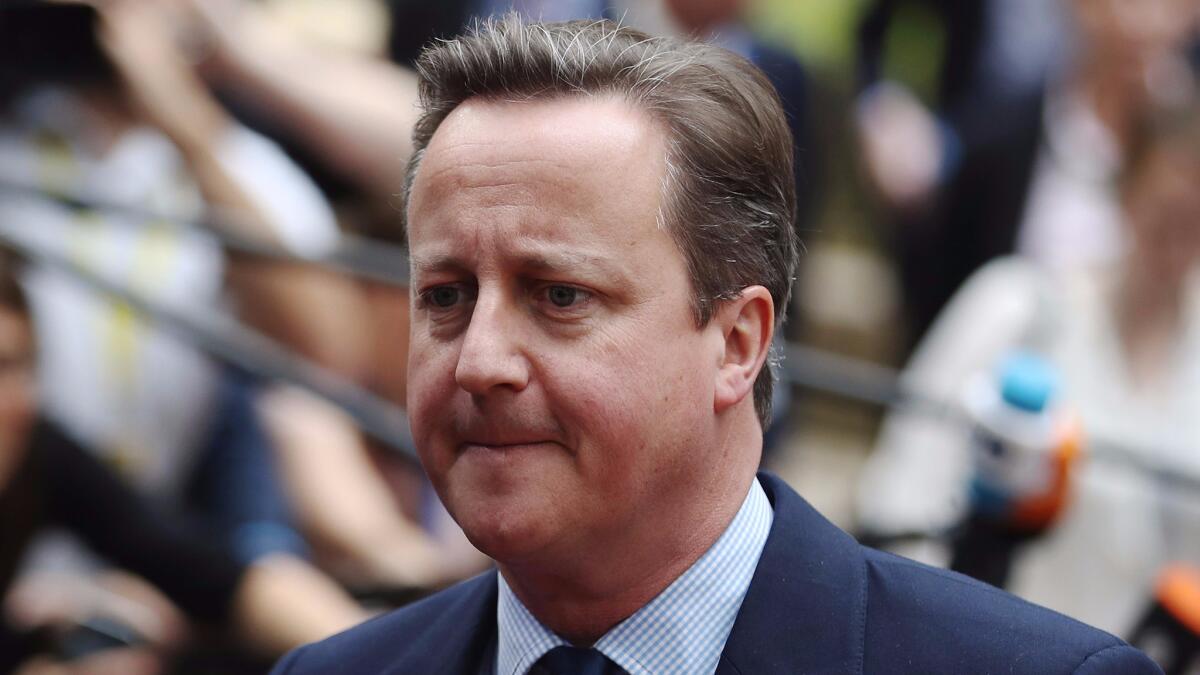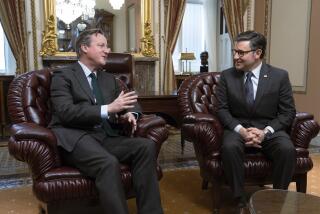European leaders tell Britain’s Cameron his nation should act quickly after ‘Brexit’ vote

British Prime Minister David Cameron attends a meeting of European Union leaders on June 28, 2016, in Brussels.
European Union leaders on Tuesday pressed British Prime Minister David Cameron to move fast in the face of political turmoil at home and unrest roiling global financial markets after the country’s vote last week to leave the alliance.
Cameron and leaders of the remaining 27 countries in the EU held a sometimes testy summit just days after 52% of Britain’s voters favored leaving the union started after World War II to generate economic cooperation and avoid war.
Cameron, who campaigned to keep Britain in the EU, has said he would step down as soon as possible after losing the “Brexit” vote and would leave it to his successor to decide when to submit Britain’s application to exit the partnership.
That condition has caused consternation across the EU as many leaders want the two-year process to untangle Britain from the EU to start as soon as possible — and not sometime in late 2016.
The EU can’t afford being held hostage by the U.K. political crisis for months.
— Belgian Prime Minister Charles Michel
Belgian Prime Minister Charles Michel told reporters in Brussels that there was no time to waste. “The EU can’t afford being held hostage by the U.K. political crisis for months,” Michel said.
Denmark’s prime minister, Lars Loekke Rasmussen, who has to contend with a growing anti-EU mood at home, also said the uncertainty would cause problems.
“We’re all waiting to get a clear answer,” Rasmussen told reporters.
The European Parliament passed a nonbinding resolution urging Britain to leave as soon as possible.
Even German Chancellor Angela Merkel, who had long been a friend and ally of Britain’s free-market, pro-business and pragmatic ways, seemed to lose patience Tuesday, telling lawmakers in Berlin before flying to Brussels that Britain won’t get any special privileges to leave.
“I can only urge our friends in Britain against deluding themselves,” she said. “We’re going to ensure that there won’t be any cherry-picking in the negotiations.”
“Anyone who wants to leave this family can’t for a moment be allowed to think they can keep all the privileges of membership without carrying any of the responsibilities,” she said.
Her remarks poured cold water on the hopes of former London Mayor Boris Johnson, a leader of the “Leave” campaign, that Britain would get the best of both worlds: continue to benefit from being part of Europe without agreeing to its rules on freedom of movement for all its citizens.
Johnson, an outspoken leader in Britain’s Conservative Party, is a top candidate to succeed Cameron.
Amid a financial market meltdown after the vote and growing public anger in Britain over immediate backsliding on Leave campaign promises, Johnson also said Monday that he expected greater cooperation between Britain and the EU after Brexit. But many who voted to leave the EU did so in the belief that it would enable Britain to stop the flow of immigrants to the country.
Cameron told reporters late Tuesday that there was some pressure for him to start the breakaway process right away. He said he had told EU leaders the Brexit referendum had hinged primarily on the immigration question because of the EU’s insistence on the freedom of movement for its citizens.
“There were some people who said this [exit] should be triggered right away,” Cameron said. “But the overwhelming view was that we need to get this right. We shouldn’t take too much time, but we should take the time to get it right. I can’t put a time frame on it.”
Ulrike Guerot, director of the European Democracy Lab at the European School of Governance in Berlin, said that Cameron was facing a rough ride by some in the EU but that others are open to Britain’s request for some time in part because of the volatile situation in that country.
The uncertainty about the timing and terms of the exit has caused havoc in the financial markets and knocked the British pound to 31-year lows. Britain also has lost its AAA credit rating because of the markets’ rout and accompanying uncertainty.
“Merkel wants time for reflection and a period of calm,” Guerot said. “It’s hard to tell what’s going to happen next. I wish I had a crystal ball.”
ALSO
British Labor Party leader Jeremy Corbyn loses no-confidence vote
Merkel warns British against ‘deluding themselves’ in departure from EU
David Horsey: Brexit diminishes Britain and threatens European security
Kirschbaum is a special correspondent.
UPDATES:
5:44 p.m.: Updated throughout.
This article was first published at 10:43 a.m.
More to Read
Start your day right
Sign up for Essential California for news, features and recommendations from the L.A. Times and beyond in your inbox six days a week.
You may occasionally receive promotional content from the Los Angeles Times.






